2020-2021学年高中英语高考二轮专题:动词的时态 语态讲练课件(34张ppt)
文档属性
| 名称 | 2020-2021学年高中英语高考二轮专题:动词的时态 语态讲练课件(34张ppt) |  | |
| 格式 | pptx | ||
| 文件大小 | 177.2KB | ||
| 资源类型 | 教案 | ||
| 版本资源 | 通用版 | ||
| 科目 | 英语 | ||
| 更新时间 | 2021-03-12 15:50:27 | ||
图片预览

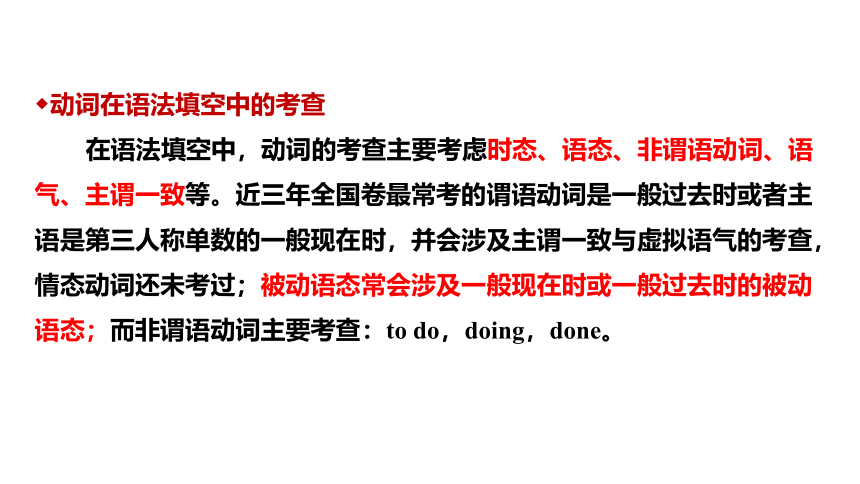
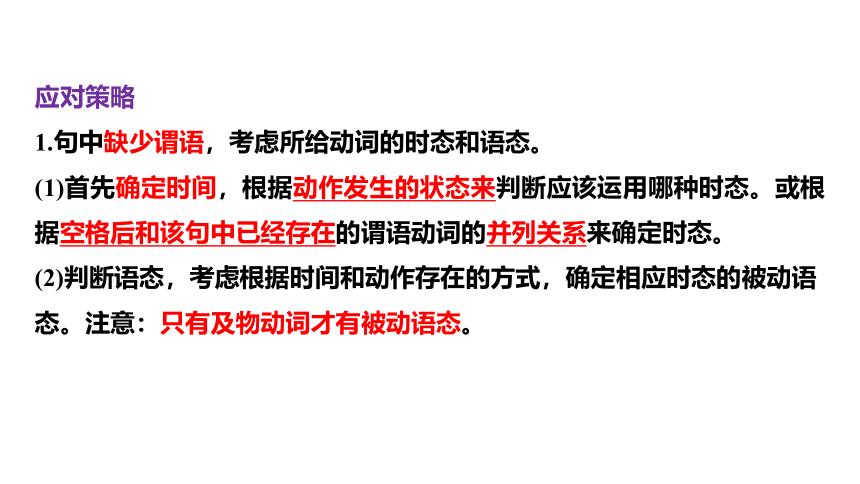
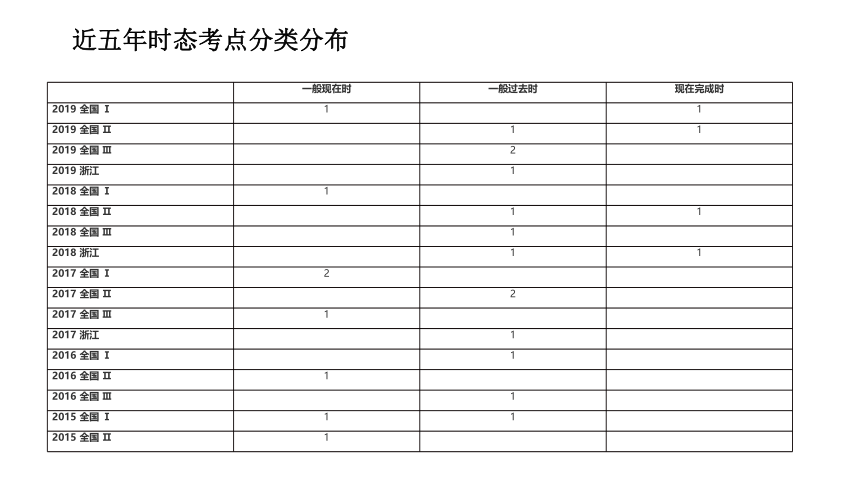
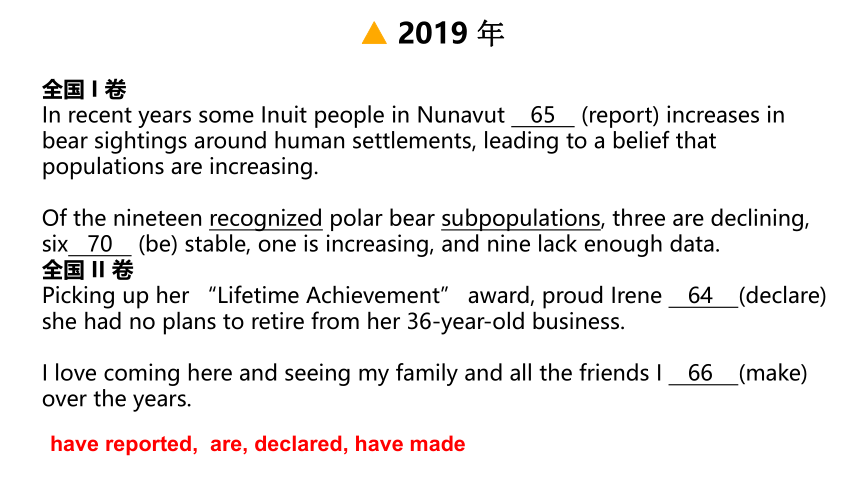
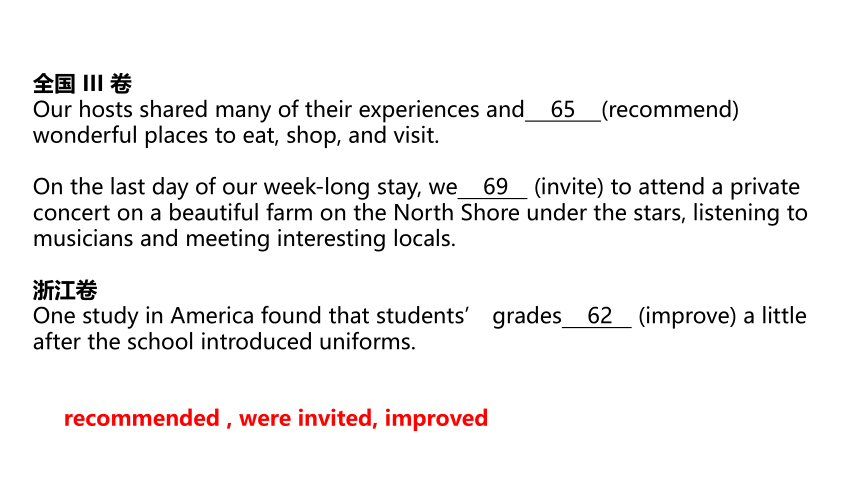
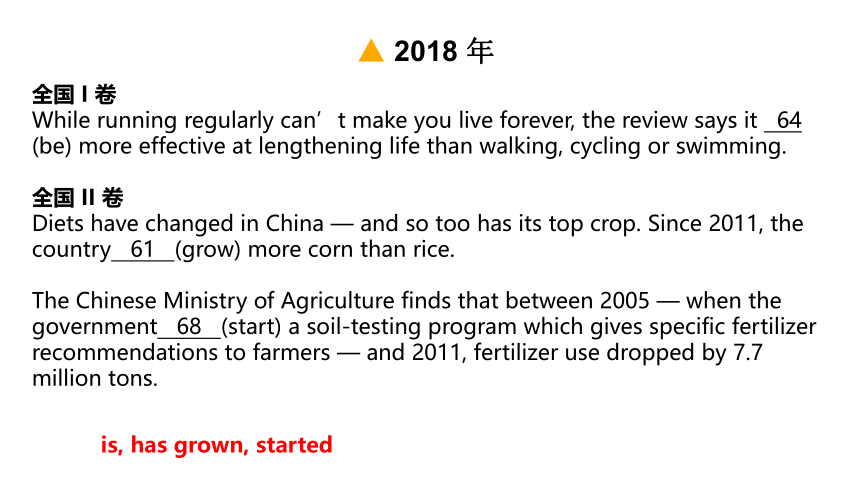
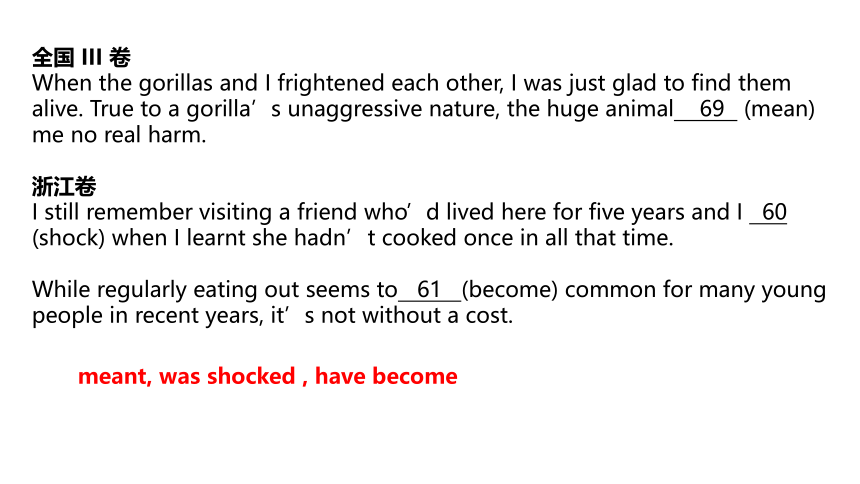
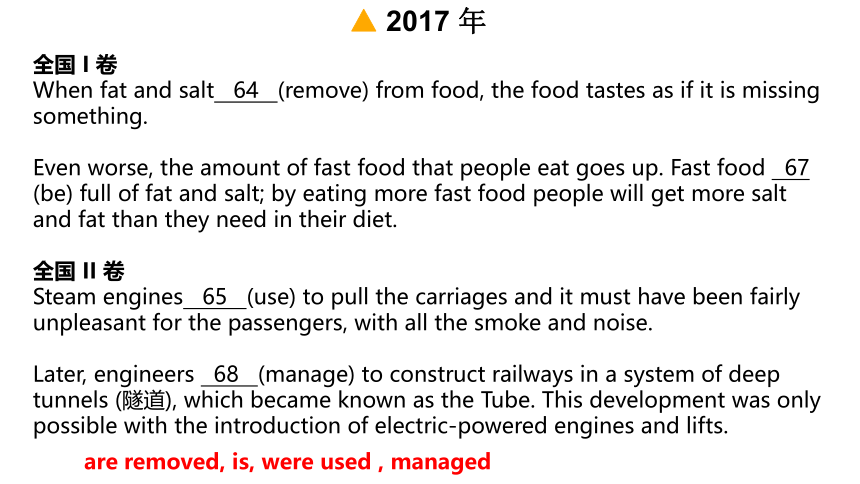
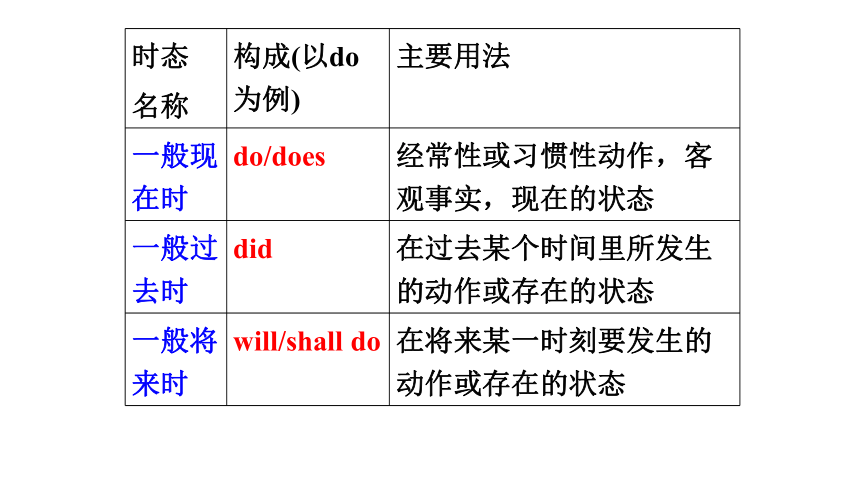
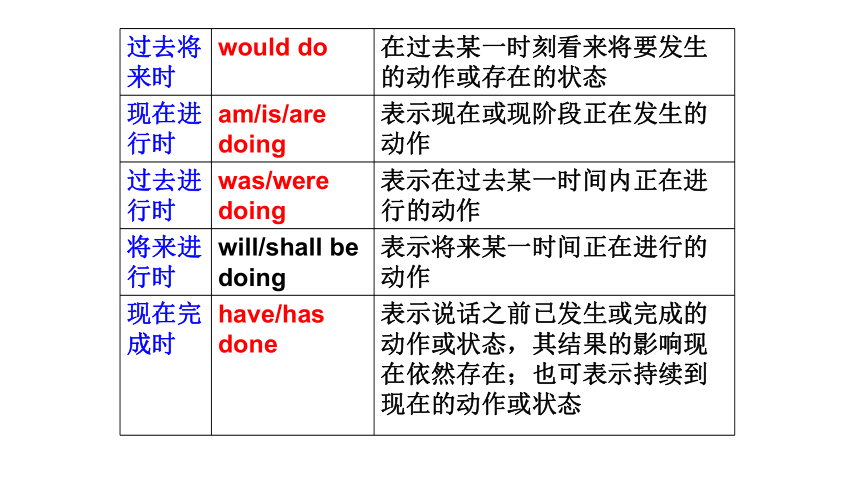
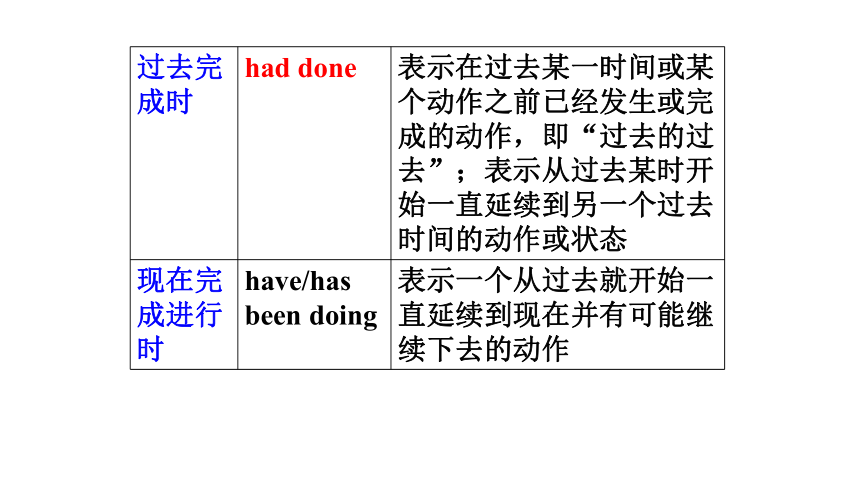
文档简介
动词与动词时态、语态
◆动词在语法填空中的考查
在语法填空中,动词的考查主要考虑时态、语态、非谓语动词、语气、主谓一致等。近三年全国卷最常考的谓语动词是一般过去时或者主语是第三人称单数的一般现在时,并会涉及主谓一致与虚拟语气的考查,情态动词还未考过;被动语态常会涉及一般现在时或一般过去时的被动语态;而非谓语动词主要考查:to do,doing,done。
应对策略
1.句中缺少谓语,考虑所给动词的时态和语态。
(1)首先确定时间,根据动作发生的状态来判断应该运用哪种时态。或根据空格后和该句中已经存在的谓语动词的并列关系来确定时态。
(2)判断语态,考虑根据时间和动作存在的方式,确定相应时态的被动语态。注意:只有及物动词才有被动语态。
{5940675A-B579-460E-94D1-54222C63F5DA}
一般现在时
一般过去时
现在完成时
2019 全国 Ⅰ
1
1
2019 全国 Ⅱ
1
1
2019 全国 Ⅲ
2
2019 浙江
1
2018 全国 Ⅰ
1
2018 全国 Ⅱ
1
1
2018 全国 Ⅲ
1
2018 浙江
1
1
2017 全国 Ⅰ
2
2017 全国 Ⅱ
2
2017 全国 Ⅲ
1
2017 浙江
1
2016 全国 Ⅰ
1
2016 全国 Ⅱ
1
2016 全国 Ⅲ
1
2015 全国 Ⅰ
1
1
2015 全国 Ⅱ
1
近五年时态考点分类分布
▲ 2019 年
全国?I?卷
In recent years some Inuit people in Nunavut????65 ???(report) increases in bear sightings around human settlements, leading to a belief that populations are increasing.? ?
Of the nineteen recognized polar bear subpopulations, three are declining, six???70 ???(be) stable, one is increasing, and nine lack enough data. ?
全国?II?卷
Picking up her “Lifetime Achievement” award, proud Irene????64 ???(declare) she had no plans to retire from her 36-year-old business. ??
I love coming here and seeing my family and all the friends I????66 ???(make) over the years.
?
?
have reported, ?are, declared, have?made
全国 III 卷 Our hosts shared many of their experiences and 65 (recommend) wonderful places to eat, shop, and visit. On the last day of our week-long stay, we 69 (invite) to attend a private concert on a beautiful farm on the North Shore under the stars, listening to musicians and meeting interesting locals.
浙江卷 One study in America found that students’ grades 62 (improve) a little after the school introduced uniforms.
recommended , were?invited, improved
▲ 2018 年
全国 I 卷 While running regularly can’t make you live forever, the review says it 64 (be) more effective at lengthening life than walking, cycling or swimming.
全国 II 卷 Diets have changed in China — and so too has its top crop. Since 2011, the country 61 (grow) more corn than rice. The Chinese Ministry of Agriculture finds that between 2005 — when the government 68 (start) a soil-testing program which gives specific fertilizer recommendations to farmers — and 2011, fertilizer use dropped by 7.7 million tons.
is, has grown, started
全国 III 卷 When the gorillas and I frightened each other, I was just glad to find them alive. True to a gorilla’s unaggressive nature, the huge animal 69 (mean) me no real harm.
浙江卷 I still remember visiting a friend who’d lived here for five years and I 60 (shock) when I learnt she hadn’t cooked once in all that time. While regularly eating out seems to 61 (become) common for many young people in recent years, it’s not without a cost.
?meant, was?shocked?, have?become
▲ 2017 年
全国 I 卷 When fat and salt 64 (remove) from food, the food tastes as if it is missing something. Even worse, the amount of fast food that people eat goes up. Fast food 67 (be) full of fat and salt; by eating more fast food people will get more salt and fat than they need in their diet.
全国 II 卷 Steam engines 65 (use) to pull the carriages and it must have been fairly unpleasant for the passengers, with all the smoke and noise. Later, engineers 68 (manage) to construct railways in a system of deep tunnels (隧道), which became known as the Tube. This development was only possible with the introduction of electric-powered engines and lifts.
are removed, is, were?used , managed
时态
名称
构成(以do为例)
主要用法
一般现在时
do/does
经常性或习惯性动作,客观事实,现在的状态
一般过去时
did
在过去某个时间里所发生的动作或存在的状态
一般将来时
will/shall do
在将来某一时刻要发生的动作或存在的状态
过去将来时
would do
在过去某一时刻看来将要发生的动作或存在的状态
现在进行时
am/is/are doing
表示现在或现阶段正在发生的动作
过去进行时
was/were doing
表示在过去某一时间内正在进行的动作
将来进行时
will/shall be doing
表示将来某一时间正在进行的动作
现在完成时
have/has done
表示说话之前已发生或完成的动作或状态,其结果的影响现在依然存在;也可表示持续到现在的动作或状态
过去完成时
had done
表示在过去某一时间或某个动作之前已经发生或完成的动作,即“过去的过去”;表示从过去某时开始一直延续到另一个过去时间的动作或状态
现在完成进行时
have/has been doing
表示一个从过去就开始一直延续到现在并有可能继续下去的动作
◆动词时态的核心考点
1.一般现在时考点分析
(1)表示客观事实或普遍真理(不受时态限制)。
Time and tide wait for no man.
(2)看时间状语(上下文语境暗示)
(3)表示知觉、态度、感情、某种抽象的关系或概念的词,see,hear,smell,taste,feel,notice,agree,believe,like,hate,want,think,belong to,seem等。
(4)在时间、条件状语从句中常用一般现在时代替将来时。
2.一般过去时考点分析
(1)看时间状语(上下文语境暗示);
(2)表示两个紧接着发生的动作,由以下词语连接,常用一般过去时。如:but,and,when,as soon as,immediately,the moment,the minute等。
3.现在完成时考点分析
(1)for,since,介词短语:during/in/over the last(past) few years(months,weeks...),in recent years,so far,up to now等。
(2)几个句型。
It is(has been)+一段时间+since从句
This(That/It) is the first(second...) time that+现在完成时
This(That/It) is the best/finest/most interesting...+that+现在完成时
4.一般将来时考点分析
(1)看时间状语,tomorrow,next week,其他表达方式be going to do,be to do,be about to do等。
(2)表示趋向行为的动词如come,go,start,begin,leave等词常用进行时的形式表示将来时。
The students are leaving on Sunday.
5.现在进行时考点分析
(1)表示说话时正在发生着的一个动作;表示现阶段但不一定是讲话时正在进行的动作;表示近期特定的安排或计划;go,come等表示移动的动词可用进行时代替将来时;与always,often等频度副词连用,表示经常反复的行为或某种感彩。
He is working on a paper.
She is teaching English and learning Chinese.
I am meeting Mr Wang tonight.
We are leaving on Friday.
The girl is always talking loud in public.
5.过去完成时考点分析
(1)常用过去完成时的几种情况。
①在by,by the end of,by the time,until,before,since后接表示过去某一时间的短语或从句的句子中。
By the end of last year,we had produced 20,000 cars.
The train had left before we reached the station.
②表示未曾实现的希望、打算、意图、诺言等,常用had hoped/planned/meant/intended/thought/wanted/expected等或用上述动词的过去式接不定式的完成式,即:hoped/planned...+to have done。
We had planned to finish the work before dark,but we were held up by a heavy rain.
③“时间名词+before”在句中作状语,谓语动词用过去完成时;“时间名词+ago”在句中作状语,谓语动词用一般过去时。
He said his first teacher had died at least 10 years before.
Xiao Hua left school three years ago.
④在hardly/scarcely...when...,no sooner...than...句式中,主句常用过去完成时,表示“一……就……”。当hardly,scarcely,no sooner置于句首时,其后要用部分倒装。
We had no sooner been seated than the bus started.=No sooner had we been seated than the bus started.
◆动词被动语态的核心考点
动词的被动语态的构成方式:be+过去分词,
1.使用被动语态时应注意的几个问题
(1)主动变为被动时双宾语的变化。
My friend gave me an interesting book on my birthday.
An interesting book was given to me (by my friend) on my birthday.
I was given an interesting book (by my friend) on my birthday.
(2)主动变为被动时,宾语成主语;(作补语的)不定式前需加to(位置不变)。
The boss made him work all day long.
He was made to work all day long (by the boss).
(3)短语动词变被动语态时,勿要掉“尾巴”。
The children were taken good care of (by her).
Your pronunciation and spelling should be paid attention to.
(4)情态动词,be going to,be to,be sure to,have to等结构变为被动语态时,只需将它们后面的动词原形变为“be+过去分词”。
We can repair this watch in two days.
This watch can be repaired in two days.
(5)当句子的谓语为say,believe,expect,think,know,write,consider,report等时,被动语态有两种形式:①谓语动词用被动语态,动词不定式作主补。②用it作形式主语,真正的主语在后面用主语从句来表示。
People say he is a smart boy.
He is said to be a smart boy.
It is said that he is a smart boy.
People know paper was made in China first.
Paper was known to be made in China first.
It is known that paper was made in China first.
类似句型有:It is said/known/suggested/believed/hoped/thought that...
2.不能用被动语态的几种情况
(1)所有的不及物动词或不及物动词词组不能用于被动语态之中。
(2)表示状态的谓语动词,如:last,hold,contain,fit,cost等。
(3)表示归属的动词,如have,own,belong to等。
(4)表示“希望、意图、喜好”的动词,如:wish,want,hope,like,love,hate等。
(5)宾语是反身代词或相互代词时谓语动词用主动语态,不能用被动语态。
(6)宾语是同源宾语、不定式、动名词等,谓语动词不用被动语态。
3.主动形式表被动意义
(1)当feel,look,smell,taste,sound等后面接形容词时;当cut,read,sell,wear,write,wash等作为不及物动词表示主语内在“品质”或“性能”时;当动词表示“开始、结束、关、停、转、启动”等意义时。
The fish smells good.
This kind of cloth washes easily.
These novels won’t sell well.
My pen writes smoothly.
The door won’t lock.
(2)当happen,occur,break out,take place,shut off,turn off,work out等动词(短语)表示“发生、关闭、制定”等意思时。
The plan worked out successfully.
The lamps on the wall turned off.
(3)want,require,need后面的动名词用主动形式表示被动含义。
(4)be worth doing用主动形式表示被动含义。
(5)在“be+形容词+to do”中,不定式的逻辑宾语是句子的主语,用主动代被动。
This kind of water isn’t fit to drink.
The girl isn’t easy to get along with.
注意:be to blame(受谴责),be to rent(出租)也用主动形式表被动。
4.被动形式表示主动意义的几种情况
be seated坐着;be hidden躲藏;be lost迷路;be drunk喝醉;be dressed穿着
5.被动语态与系表结构的区别
此处的系表结构指“连系动词+用作表语的过去分词”结构,它与被动语态的形式完全一样。要注意它们的区别:
被动语态强调动作;系表结构表示主语的特点或状态。
The book was sold by a certain bookstore.(被动语态)
The book is well sold.(系表结构)
Ⅰ.单句语法填空
1.Being too anxious to help an event develop often (result) in the contrary to our intention.
2.By the time you have finished this book,your meal (get) cold.
3.I’ll go to the library as soon as I finish what I (do).
4.Did you predict that many students (sign) up for the dance competition?
results
will get
am doing
would sign
题组一 动词时态集训
5.In order to find the missing child,villagers (do) all they can over the past five hours.
6.This is the first time we (see) a film in the cinema together as a family.
have been doing
have seen
Ⅰ.单句语法填空
1.If you listen to rap music,you will notice how the lyrics(歌词) ___________
(speak) in the background of the songs.
2.Such a thing has never (hear) of before.
3.Don’t worry.The hard work that you do now (repay) later in life.
4.Great changes (take) place in our school since 2010.
5.The professor was delighted to find that two thirds of the project ____
(finish) by the students independently.
are spoken
been heard
will be repaid
have taken
题组二 动词被动语态集训
had
been finished
Ⅲ.语法填空(动词的时态和语态专练)
A university graduate described as a “respectable and intelligent” woman 1. (seek) professional help after being convicted of(证明有……罪) shoplifting for the second time in six months.
Aha Luz,recently studying for PhD 2. (tell) she would end up behind bars unless she can control the desire to steal from shops.
Luz,who 3. (live) with her partner in Fitzwdliam Road,Cambridge,
4. (admit) stealing clothes worth 9.95 pounds from Lewis in Oxford Street,London,on March 9.
is seeking
has been told
lives
admitted
Philip Lomoyne,prosecuting(起诉),said Luz 5. (select) some clothes from a display and 6. (take) them to the ladies’ toilet in the store.When she came out again she 7. (wear) one of the skirts she 8. (select),having taken off the anti-theft security alarm.
She 9. (stop) and caught after leaving the store without paying,Mr Lomoyne said.He added that she was upset on her arrest and 10. (apologize) for her actions.
selected
took
was wearing
had selected
was stopped
apologized
1.中式英语比比皆是
◆书面表达中谓语动词易错点聚焦
(误)I very like listen music and every day I also will see some newspapers.
(正)I like listening to music very much and every day I read some newspapers as well.(习惯性动作用一般现在时)
(误)I don’t know I should do what.
(正)I don’t know what I should do.
2.句子没有谓语动词或一个句子中出现多个谓语
(误)The windows broken.
(正)The windows are (were) broken.
(误)Today,the largest number of people speak English may be in China.
(正)Today,the largest number of people who speak English may be in China.
(正)Today,the largest number of people speaking English may be in China.
3.动词的时态、语态及系动词be的乱用
(误)Recently,the CCTV and some TVs began to take some measures.
(正)Recently,the CCTV and some TVs have begun to take some measures.
(误)She liked it very much and reads it to the class.
(正)She liked it very much and read it to the class.
◆动词在语法填空中的考查
在语法填空中,动词的考查主要考虑时态、语态、非谓语动词、语气、主谓一致等。近三年全国卷最常考的谓语动词是一般过去时或者主语是第三人称单数的一般现在时,并会涉及主谓一致与虚拟语气的考查,情态动词还未考过;被动语态常会涉及一般现在时或一般过去时的被动语态;而非谓语动词主要考查:to do,doing,done。
应对策略
1.句中缺少谓语,考虑所给动词的时态和语态。
(1)首先确定时间,根据动作发生的状态来判断应该运用哪种时态。或根据空格后和该句中已经存在的谓语动词的并列关系来确定时态。
(2)判断语态,考虑根据时间和动作存在的方式,确定相应时态的被动语态。注意:只有及物动词才有被动语态。
{5940675A-B579-460E-94D1-54222C63F5DA}
一般现在时
一般过去时
现在完成时
2019 全国 Ⅰ
1
1
2019 全国 Ⅱ
1
1
2019 全国 Ⅲ
2
2019 浙江
1
2018 全国 Ⅰ
1
2018 全国 Ⅱ
1
1
2018 全国 Ⅲ
1
2018 浙江
1
1
2017 全国 Ⅰ
2
2017 全国 Ⅱ
2
2017 全国 Ⅲ
1
2017 浙江
1
2016 全国 Ⅰ
1
2016 全国 Ⅱ
1
2016 全国 Ⅲ
1
2015 全国 Ⅰ
1
1
2015 全国 Ⅱ
1
近五年时态考点分类分布
▲ 2019 年
全国?I?卷
In recent years some Inuit people in Nunavut????65 ???(report) increases in bear sightings around human settlements, leading to a belief that populations are increasing.? ?
Of the nineteen recognized polar bear subpopulations, three are declining, six???70 ???(be) stable, one is increasing, and nine lack enough data. ?
全国?II?卷
Picking up her “Lifetime Achievement” award, proud Irene????64 ???(declare) she had no plans to retire from her 36-year-old business. ??
I love coming here and seeing my family and all the friends I????66 ???(make) over the years.
?
?
have reported, ?are, declared, have?made
全国 III 卷 Our hosts shared many of their experiences and 65 (recommend) wonderful places to eat, shop, and visit. On the last day of our week-long stay, we 69 (invite) to attend a private concert on a beautiful farm on the North Shore under the stars, listening to musicians and meeting interesting locals.
浙江卷 One study in America found that students’ grades 62 (improve) a little after the school introduced uniforms.
recommended , were?invited, improved
▲ 2018 年
全国 I 卷 While running regularly can’t make you live forever, the review says it 64 (be) more effective at lengthening life than walking, cycling or swimming.
全国 II 卷 Diets have changed in China — and so too has its top crop. Since 2011, the country 61 (grow) more corn than rice. The Chinese Ministry of Agriculture finds that between 2005 — when the government 68 (start) a soil-testing program which gives specific fertilizer recommendations to farmers — and 2011, fertilizer use dropped by 7.7 million tons.
is, has grown, started
全国 III 卷 When the gorillas and I frightened each other, I was just glad to find them alive. True to a gorilla’s unaggressive nature, the huge animal 69 (mean) me no real harm.
浙江卷 I still remember visiting a friend who’d lived here for five years and I 60 (shock) when I learnt she hadn’t cooked once in all that time. While regularly eating out seems to 61 (become) common for many young people in recent years, it’s not without a cost.
?meant, was?shocked?, have?become
▲ 2017 年
全国 I 卷 When fat and salt 64 (remove) from food, the food tastes as if it is missing something. Even worse, the amount of fast food that people eat goes up. Fast food 67 (be) full of fat and salt; by eating more fast food people will get more salt and fat than they need in their diet.
全国 II 卷 Steam engines 65 (use) to pull the carriages and it must have been fairly unpleasant for the passengers, with all the smoke and noise. Later, engineers 68 (manage) to construct railways in a system of deep tunnels (隧道), which became known as the Tube. This development was only possible with the introduction of electric-powered engines and lifts.
are removed, is, were?used , managed
时态
名称
构成(以do为例)
主要用法
一般现在时
do/does
经常性或习惯性动作,客观事实,现在的状态
一般过去时
did
在过去某个时间里所发生的动作或存在的状态
一般将来时
will/shall do
在将来某一时刻要发生的动作或存在的状态
过去将来时
would do
在过去某一时刻看来将要发生的动作或存在的状态
现在进行时
am/is/are doing
表示现在或现阶段正在发生的动作
过去进行时
was/were doing
表示在过去某一时间内正在进行的动作
将来进行时
will/shall be doing
表示将来某一时间正在进行的动作
现在完成时
have/has done
表示说话之前已发生或完成的动作或状态,其结果的影响现在依然存在;也可表示持续到现在的动作或状态
过去完成时
had done
表示在过去某一时间或某个动作之前已经发生或完成的动作,即“过去的过去”;表示从过去某时开始一直延续到另一个过去时间的动作或状态
现在完成进行时
have/has been doing
表示一个从过去就开始一直延续到现在并有可能继续下去的动作
◆动词时态的核心考点
1.一般现在时考点分析
(1)表示客观事实或普遍真理(不受时态限制)。
Time and tide wait for no man.
(2)看时间状语(上下文语境暗示)
(3)表示知觉、态度、感情、某种抽象的关系或概念的词,see,hear,smell,taste,feel,notice,agree,believe,like,hate,want,think,belong to,seem等。
(4)在时间、条件状语从句中常用一般现在时代替将来时。
2.一般过去时考点分析
(1)看时间状语(上下文语境暗示);
(2)表示两个紧接着发生的动作,由以下词语连接,常用一般过去时。如:but,and,when,as soon as,immediately,the moment,the minute等。
3.现在完成时考点分析
(1)for,since,介词短语:during/in/over the last(past) few years(months,weeks...),in recent years,so far,up to now等。
(2)几个句型。
It is(has been)+一段时间+since从句
This(That/It) is the first(second...) time that+现在完成时
This(That/It) is the best/finest/most interesting...+that+现在完成时
4.一般将来时考点分析
(1)看时间状语,tomorrow,next week,其他表达方式be going to do,be to do,be about to do等。
(2)表示趋向行为的动词如come,go,start,begin,leave等词常用进行时的形式表示将来时。
The students are leaving on Sunday.
5.现在进行时考点分析
(1)表示说话时正在发生着的一个动作;表示现阶段但不一定是讲话时正在进行的动作;表示近期特定的安排或计划;go,come等表示移动的动词可用进行时代替将来时;与always,often等频度副词连用,表示经常反复的行为或某种感彩。
He is working on a paper.
She is teaching English and learning Chinese.
I am meeting Mr Wang tonight.
We are leaving on Friday.
The girl is always talking loud in public.
5.过去完成时考点分析
(1)常用过去完成时的几种情况。
①在by,by the end of,by the time,until,before,since后接表示过去某一时间的短语或从句的句子中。
By the end of last year,we had produced 20,000 cars.
The train had left before we reached the station.
②表示未曾实现的希望、打算、意图、诺言等,常用had hoped/planned/meant/intended/thought/wanted/expected等或用上述动词的过去式接不定式的完成式,即:hoped/planned...+to have done。
We had planned to finish the work before dark,but we were held up by a heavy rain.
③“时间名词+before”在句中作状语,谓语动词用过去完成时;“时间名词+ago”在句中作状语,谓语动词用一般过去时。
He said his first teacher had died at least 10 years before.
Xiao Hua left school three years ago.
④在hardly/scarcely...when...,no sooner...than...句式中,主句常用过去完成时,表示“一……就……”。当hardly,scarcely,no sooner置于句首时,其后要用部分倒装。
We had no sooner been seated than the bus started.=No sooner had we been seated than the bus started.
◆动词被动语态的核心考点
动词的被动语态的构成方式:be+过去分词,
1.使用被动语态时应注意的几个问题
(1)主动变为被动时双宾语的变化。
My friend gave me an interesting book on my birthday.
An interesting book was given to me (by my friend) on my birthday.
I was given an interesting book (by my friend) on my birthday.
(2)主动变为被动时,宾语成主语;(作补语的)不定式前需加to(位置不变)。
The boss made him work all day long.
He was made to work all day long (by the boss).
(3)短语动词变被动语态时,勿要掉“尾巴”。
The children were taken good care of (by her).
Your pronunciation and spelling should be paid attention to.
(4)情态动词,be going to,be to,be sure to,have to等结构变为被动语态时,只需将它们后面的动词原形变为“be+过去分词”。
We can repair this watch in two days.
This watch can be repaired in two days.
(5)当句子的谓语为say,believe,expect,think,know,write,consider,report等时,被动语态有两种形式:①谓语动词用被动语态,动词不定式作主补。②用it作形式主语,真正的主语在后面用主语从句来表示。
People say he is a smart boy.
He is said to be a smart boy.
It is said that he is a smart boy.
People know paper was made in China first.
Paper was known to be made in China first.
It is known that paper was made in China first.
类似句型有:It is said/known/suggested/believed/hoped/thought that...
2.不能用被动语态的几种情况
(1)所有的不及物动词或不及物动词词组不能用于被动语态之中。
(2)表示状态的谓语动词,如:last,hold,contain,fit,cost等。
(3)表示归属的动词,如have,own,belong to等。
(4)表示“希望、意图、喜好”的动词,如:wish,want,hope,like,love,hate等。
(5)宾语是反身代词或相互代词时谓语动词用主动语态,不能用被动语态。
(6)宾语是同源宾语、不定式、动名词等,谓语动词不用被动语态。
3.主动形式表被动意义
(1)当feel,look,smell,taste,sound等后面接形容词时;当cut,read,sell,wear,write,wash等作为不及物动词表示主语内在“品质”或“性能”时;当动词表示“开始、结束、关、停、转、启动”等意义时。
The fish smells good.
This kind of cloth washes easily.
These novels won’t sell well.
My pen writes smoothly.
The door won’t lock.
(2)当happen,occur,break out,take place,shut off,turn off,work out等动词(短语)表示“发生、关闭、制定”等意思时。
The plan worked out successfully.
The lamps on the wall turned off.
(3)want,require,need后面的动名词用主动形式表示被动含义。
(4)be worth doing用主动形式表示被动含义。
(5)在“be+形容词+to do”中,不定式的逻辑宾语是句子的主语,用主动代被动。
This kind of water isn’t fit to drink.
The girl isn’t easy to get along with.
注意:be to blame(受谴责),be to rent(出租)也用主动形式表被动。
4.被动形式表示主动意义的几种情况
be seated坐着;be hidden躲藏;be lost迷路;be drunk喝醉;be dressed穿着
5.被动语态与系表结构的区别
此处的系表结构指“连系动词+用作表语的过去分词”结构,它与被动语态的形式完全一样。要注意它们的区别:
被动语态强调动作;系表结构表示主语的特点或状态。
The book was sold by a certain bookstore.(被动语态)
The book is well sold.(系表结构)
Ⅰ.单句语法填空
1.Being too anxious to help an event develop often (result) in the contrary to our intention.
2.By the time you have finished this book,your meal (get) cold.
3.I’ll go to the library as soon as I finish what I (do).
4.Did you predict that many students (sign) up for the dance competition?
results
will get
am doing
would sign
题组一 动词时态集训
5.In order to find the missing child,villagers (do) all they can over the past five hours.
6.This is the first time we (see) a film in the cinema together as a family.
have been doing
have seen
Ⅰ.单句语法填空
1.If you listen to rap music,you will notice how the lyrics(歌词) ___________
(speak) in the background of the songs.
2.Such a thing has never (hear) of before.
3.Don’t worry.The hard work that you do now (repay) later in life.
4.Great changes (take) place in our school since 2010.
5.The professor was delighted to find that two thirds of the project ____
(finish) by the students independently.
are spoken
been heard
will be repaid
have taken
题组二 动词被动语态集训
had
been finished
Ⅲ.语法填空(动词的时态和语态专练)
A university graduate described as a “respectable and intelligent” woman 1. (seek) professional help after being convicted of(证明有……罪) shoplifting for the second time in six months.
Aha Luz,recently studying for PhD 2. (tell) she would end up behind bars unless she can control the desire to steal from shops.
Luz,who 3. (live) with her partner in Fitzwdliam Road,Cambridge,
4. (admit) stealing clothes worth 9.95 pounds from Lewis in Oxford Street,London,on March 9.
is seeking
has been told
lives
admitted
Philip Lomoyne,prosecuting(起诉),said Luz 5. (select) some clothes from a display and 6. (take) them to the ladies’ toilet in the store.When she came out again she 7. (wear) one of the skirts she 8. (select),having taken off the anti-theft security alarm.
She 9. (stop) and caught after leaving the store without paying,Mr Lomoyne said.He added that she was upset on her arrest and 10. (apologize) for her actions.
selected
took
was wearing
had selected
was stopped
apologized
1.中式英语比比皆是
◆书面表达中谓语动词易错点聚焦
(误)I very like listen music and every day I also will see some newspapers.
(正)I like listening to music very much and every day I read some newspapers as well.(习惯性动作用一般现在时)
(误)I don’t know I should do what.
(正)I don’t know what I should do.
2.句子没有谓语动词或一个句子中出现多个谓语
(误)The windows broken.
(正)The windows are (were) broken.
(误)Today,the largest number of people speak English may be in China.
(正)Today,the largest number of people who speak English may be in China.
(正)Today,the largest number of people speaking English may be in China.
3.动词的时态、语态及系动词be的乱用
(误)Recently,the CCTV and some TVs began to take some measures.
(正)Recently,the CCTV and some TVs have begun to take some measures.
(误)She liked it very much and reads it to the class.
(正)She liked it very much and read it to the class.
